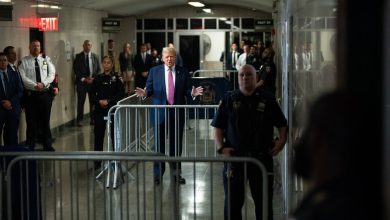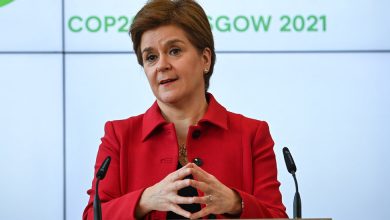With WMware deal, Broadcom reaches for the cloud


A big deal.Credit…Dado Ruvic/Reuters
Now even broader
The chip manufacturer Broadcom announced a blockbuster $61 billion deal this morning for VMware, a tech company that specializes in data centers. The deal is the second largest this year, behind Microsoft’s January acquisition of Activision, and one of the largest in tech this past decade. It values VMware at over 40 percent more than its share price before rumors of a deal began to circulate this week.
The proposed combination would make Broadcom a significant player in cloud computing. VMware has more than 500,000 customers and counts all of the major cloud providers as partners, including Amazon, Microsoft and Google. The VM stands for virtual machines.
Broadcom’s C.E.O., Hock Tan, has been one of the most acquisitive forces in the semiconductor industry, stitching the company together one chip deal at a time. That effort sputtered when former President Donald Trump blocked Broadcom’s proposed $117 billion takeover of Qualcomm in March 2018 on national security grounds. (Broadcom was once based in Singapore but has moved its headquarters to San Jose, Calif.) Since then, Tan has diversified his targets: He bought the software company CA Technologies for $18.9 billion in 2018 and a security division of Symantec for $10.7 billion the following year.
But the latest acquisition isn’t a done, done deal, yet. The terms include a go-shop period, giving VMware’s management 40 days to seek a better offer. Buying VMware could make sense for any number of other companies, such as IBM or Intel. It’s also the business that Intel’s C.E.O., Pat Gelsinger, previously ran. “I have a lot of soul in that company,” Gelsinger said of VMware this week while at the World Economic Forum meeting in Davos. “And any change in structure or acquisition, what I would be motivated to see is the innovation spirit of VMWare alive and well.” Also at Davos: representatives from VMware.
There could be more deals to come. As the stock market has cratered technology companies’ valuations, potential cash buyers could scoop up companies at a discount. Private equity firms have also been scouting for bargains, DealBook hears.
HERE’S WHAT’S HAPPENING
Apple raises pay. The iPhone maker yesterday said that the minimum hourly wage for U.S. its retail workers would rise to $22 per hour and that it would award annual raises several months early. Other companies are also increasing salaries, amid a tight labor market and rising prices, and as retail employees consider unionizing.
Vanguard stands by its fossil fuel investments. Vanguard, the world’s second largest asset manager and the largest investor in coal companies globally, engages with companies on climate risks to ensure the market has priced them in, its C.E.O., Tim Buckley, said. “Climate change is a material risk but it is only one factor in an investment decision,” he added.
The S.E.C. suggests more disclosure requirements for socially responsible funds. The agency issued two proposals yesterday that focus on concerns about “greenwashing” and giving investors more information about exchange-traded funds and mutual funds with an E.S.G. focus.
Bolt, the payments start-up, lays off employees. Maju Kuruvilla, the chief executive, attributed the layoffs to “structural changes” amid “macro challenges,” but did not provide further details. It’s a reflection of a souring fund-raising environment for start-ups. On Monday, Klarna, the Swedish payments giant, said it would lay off about 10 percent of its staff.
India’s blistering heat and storms devastate crops. Intense heat in northern India and heavy rains in southern India have wiped out mango crops and threatened the livelihoods of the thousands of small farmers. The heat wave exemplifies challenges India, the world’s largest mango producer, faces in feeding a growing population of 1.4 billion as the effects of climate change worsen.
The Fed’s need for speed
Stocks jumped yesterday after minutes from the Fed’s most recent meeting showed that officials believe they need to move “expeditiously” to bring down inflation, raising interest rates in half-point chunks rather than their usual quarter points.
The S&P 500 ended the day up nearly 1 percent, though it’s still well down for the year. Futures markets suggest stocks could rise again today.
That’s the opposite of the market’s usual response to rate rises, which tend to slow the economy and squeeze corporate profits. So what’s different? “Investors want the Fed to get out of the way soon,” Vincent Reinhart, a former Fed official now at Dreyfus and Mellon, told DealBook. The thinking, he said, was that half-point raises would be “better than doing quarters to get to the same place.”
The question is whether a fast-moving Fed is more likely to hurt the economy. Most Wall Street strategists don’t predict a recession until 2023. And it’s easier to absorb rate increases in good times than bad. But Wall Street may not have the timing right. If the economy is weaker than it looks, raising rates sharply could lead to a crash.
There are signs that the economy may be starting to skid. Last week, retailers including Target and Walmart reported weaker-than-expected earnings. They said their biggest problem now was not stocking goods — the supply-chain trouble that has pushed prices higher — but getting them off their shelves. That suggests consumer demand is softening.
Some prominent investors are pushing for even more inflation-fighting. Earlier this week, the hedge fund manager Bill Ackman tweeted that the Fed shouldn’t be worried about what happens to the economy in the next year. Aggressive rate increases would “protect and enhance” the economy for all, he argued.
But some economists argue that inflation may already have peaked. “The demands for a reign of fire and blood to curb inflation are getting louder even as the case for such a reign is getting weaker,” tweeted our Times Opinion colleague Paul Krugman.
“South Koreans live with an enormous tolerance for abuse, but when they can’t take it anymore and explode, they call it gapjil.”
— Park Chang-jin, a former Korean Air flight attendant, on an increasingly popular term for worker mistreatment in South Korea, which has one of the longest workweeks among wealthier nations.
What Musk’s new financing means for the Twitter deal
Elon Musk won’t leverage Tesla’s shares to buy Twitter after all. The Tesla C.E.O. and outspoken, especially on Twitter, billionaire revealed a new financing arrangement yesterday for his $44.5 billion bid to buy the social network. Gone is the loan that he planned to take out against Tesla shares. Instead, more will come right out of Musk’s, and potentially others’, pockets.
The move comes as Tesla’s stock price has fallen some 30 percent, to just under $660, over the past month. And it highlights Musk’s commitment to the Twitter deal, even as he continues to rail against the company. Shares of Twitter are up 10 percent on the news, but at $39, remain well below the $54.20 a share Musk has agreed, signaling that investors still aren’t certain of the deal.
Musk had already reduced his reliance on his Tesla shares. His initial plan was to put $33.5 billion up to buy Twitter, and finance the rest, $11 billion, with debt. Of the $33.5 billion in equity, $21 billion was directly from him,with $12.5 billion coming through a bank loan against his Tesla shares. He later brought in $7 billion from outside investors, cutting the loan to $6.25 billion. With this latest announcement, he is scrapping the loan entirely.
Still, the reason for the latest switch is not clear. It could be that borrowing against Tesla stock put the deal at risk, now that the carmaker’s share price has dropped. (Musk has already borrowed tens of billions against his shares.) Musk also says he is continuing to talk with Twitter shareholders, including the co-founder Jack Dorsey, about rolling over their stakes to help finance his deal.
None of this has stopped Musk from throwing jabs. He took aim at Twitter after the F.T.C. and Justice Department fined the company $150 million for doing less than it had promised to protect users’ data from marketers. “If Twitter was not truthful here, what else is not true?” Musk said. “This is very concerning news.”
Gun stocks rise despite E.S.G. concerns
The rise of E.S.G. investing, as well as mass shootings like the one that happened this week in Uvalde, Texas, put a spotlight on the role financial institutions play in propping up gun companies. Shares in Smith & Wesson, Sturm Ruger and Vista Outdoor, among other gun companies, rose yesterday, as is typical after mass shootings.
E.S.G., which stands for environmental, social and governance, has become an important force on Wall Street. Some call it “woke capitalism.”Nonetheless, many money managers still own gun stocks. BlackRock and Vanguard invest in gun stocks, for clients, mostly through funds that track the market or portions of it. Sellers of guns and ammunition, like Walmart, are even more common in broad-based mutual funds, index funds and pension funds.
The question now is whether another mass shooting could finally inspire Wall Street to think more strongly about divesting from guns. “School shootings really grab people’s attention” in a way that perhaps other mass shootings don’t, said Jon Hale, the director of sustainability research for the Americas at Sustainalytics, a unit of the investment research firm Morningstar. And with the Texas attack coming so soon after the Buffalo shooting, he expects that financial advisers will face another uptick in calls about gun stocks from clients. “Maybe they thought about it before,” he said, “and something like this happens and it reminds them again: I should check my investments.”
Some E.S.G. funds have been slow to divest for several reasons, Alex Edmans, a finance professor at London Business School who is on the responsible investment committee for the investment management company Royal London Asset Management, told DealBook. As with other investors, an objective of E.S.G. funds is to get strong returns. “It’s not clear from a purely financial perspective that you would necessarily want to exclude guns,” he said. “If we don’t think regulation is going to be changing, there’s an economic case for investing in them.”
THE SPEED READ
Deals
-
Toshiba tapped activists for its board, potentially setting up the company to go private. (Bloomberg)
-
Saudi Aramco approached Valvoline about buying its lubricants line. (WSJ)
Policy
-
The crypto industry’s ties to asset managers pose a risk to financial stability, the European Central Bank said. (FT)
-
Russia’s central bank cut its benchmark interest rate to 11 percent. (NYT)
-
“In the U.S., Backlash to Civil Rights Era Made Guns a Political Third Rail” (NYT)
-
Big cities across the U.S. lost population last year. (WSJ)
Best of the rest
-
The best and worst cities for work-life balance. (Bloomberg)
-
For some, being a hedge fund manager means never having to say you’re sorry. (Bloomberg Opinion)
-
Twitter’s lame-duck C.E.O. is trying to stay the course. (NYT)
-
E. Gerald Corrigan, a U.S. central banker during Black Monday who pushed for the Fed to do more to resolve financial panics, has died. (NYT)We’d like your feedback! Please email thoughts and suggestions to [email protected].



